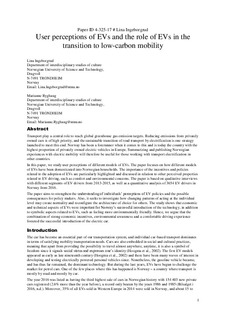| dc.contributor.author | Ingeborgrud, Lina | |
| dc.contributor.author | Ryghaug, Marianne | |
| dc.date.accessioned | 2017-11-10T09:57:02Z | |
| dc.date.available | 2017-11-10T09:57:02Z | |
| dc.date.created | 2017-07-03T19:50:49Z | |
| dc.date.issued | 2017 | |
| dc.identifier.citation | Eceee ... summer study proceedings. 2017, 893-900. | nb_NO |
| dc.identifier.issn | 1653-7025 | |
| dc.identifier.uri | http://hdl.handle.net/11250/2465494 | |
| dc.description.abstract | Transport play a central role to reach global greenhouse gas emission targets. Reducing emissions from privately owned cars is of high priority, and the sustainable transition of road transport by electrification is one strategy launched to meet this end. Norway has been a forerunner when it comes to this and is today the country with the highest proportion of privately owned electric vehicles in Europe. Summarizing and publishing Norwegian experiences with electric mobility will therefore be useful for those working with transport electrification in other countries. In this paper, we study user perceptions of different models of EVs. The paper focuses on how different models of EVs have been domesticated into Norwegian households. The importance of the incentives and policies related to the adoption of EVs are particularly highlighted and discussed in relation to other perceived properties related to EV driving, such as comfort and environmental concerns. The paper is based on qualitative interviews with different segments of EV drivers from 2013-2015, as well as a quantitative analysis of 3654 EV drivers in Norway from 2016. The paper aims to strengthen the understanding of individuals’ perceptions of EV policies and the possible consequences for policy makers. Also, it seeks to investigate how changing patterns of acting at the individual level may create normality and reconfigure the architecture of choice for others. The study shows that economic and technical aspects of EVs were important for Norway’s successful introduction of the technology, in addition to symbolic aspects related to EVs, such as feeling more environmentally friendly. Hence, we argue that the combination of strong economic incentives, environmental awareness and a comfortable driving experience fostered the successful introduction of the electric car. | nb_NO |
| dc.language.iso | eng | nb_NO |
| dc.publisher | European Council for an Energy Efficient Economy, ECEEE | nb_NO |
| dc.title | User perceptions of EVs and the role of EVs in the transition to low-carbon mobility | nb_NO |
| dc.type | Journal article | nb_NO |
| dc.type | Peer reviewed | nb_NO |
| dc.description.version | acceptedVersion | nb_NO |
| dc.source.pagenumber | 893-900 | nb_NO |
| dc.source.journal | Eceee ... summer study proceedings | nb_NO |
| dc.identifier.cristin | 1480579 | |
| dc.description.localcode | This is the authors’ accepted and refereed manuscript of an article published by ECEEE, available at http://proceedings.eceee.org | nb_NO |
| cristin.unitcode | 194,62,40,0 | |
| cristin.unitname | Institutt for tverrfaglige kulturstudier | |
| cristin.ispublished | true | |
| cristin.fulltext | original | |
| cristin.fulltext | postprint | |
| cristin.qualitycode | 1 | |
